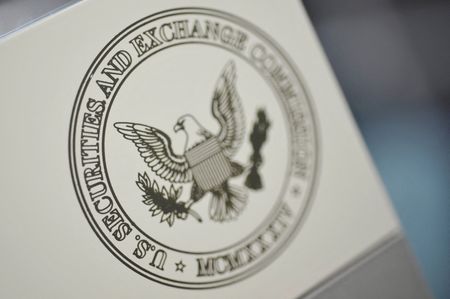By John McCrank and Chris Prentice
(Reuters) -The U.S. Securities and Exchange Commission on Wednesday proposed new rules aimed at better preparing the mutual fund industry for distressed market conditions, including a new pricing mechanism that has drawn opposition from fund managers.
The market disruptions of March 2020 reinforced the fact that liquidity can deteriorate rapidly, said the SEC, which adopted the proposal in a 3-2 vote.
“In times of stress, when many investors may redeem their shares in a fund at once, a fund might need to sell less-liquid securities quickly to generate cash,” SEC Chair Gary Gensler said. “When done in volume, this can raise issues for investor protection, our capital markets, and the broader economy.”
The proposed rule would require mutual funds, and some exchange-traded funds, to ensure that at least 10% of their net assets are highly liquid.
The new requirements would also demand a hard daily closing time for mutual funds, and the use of “swing pricing,” which involves adjusting a fund’s value in line with trading activity so redeeming investors bear the costs of exiting without diluting remaining investors.
The rules could have a big impact on how retirement savings are handled. Mutual funds managed $4.1 trillion, or 63%, of assets held in 401(k) plans at the end of June, as well as $5.1 trillion, or 43%, of IRA assets, according to the Investment Company Institute.
The group, which represents top asset managers, criticized Wednesday’s proposal. Chief executive officer Eric Pan said it could cause an “enormous negative impact” on Americans who invest in such funds, which are already “highly liquid” products.
The plan will be open for comment before being finalized.
Asset managers have also pushed back against an SEC proposal from December that would implement swing pricing for money market funds, arguing it would be operationally challenging, impose excessive costs on fund sponsors, and reduce daily liquidity for investors, potentially killing off some popular products.
Separately, the SEC voted 3-2 in favor of adopting new rules aimed at enhancing the reporting of proxy votes by registered management investment companies and the reporting of executive compensation votes by institutional investment managers.
Funds will now have to categorize the votes in a consistent manner and disclose the number of shares voted for proxy cards filed with the SEC. Investment managers will also have to report how they voted on proxies related to executive compensation, or “say on pay” votes.
(Reporting by John McCrank in New York and Chris Prentice in WashingtonEditing by Matthew Lewis, Kirsten Donovan)

